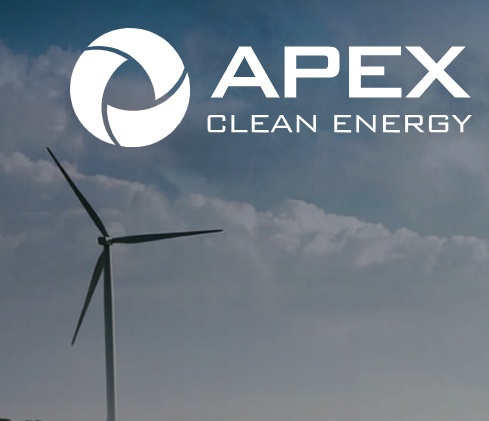May 23, 2024 – Five employees of Apex Clean Energy met with county commissioners on this past Wednesday for a scheduled work session to inform the Hopkins County Court of their intentions to lease up to 14,000 acres in hopes to erect up to 100 giant windmills. Two major electricity transmission lines disect Hopkins County making the area appealing to wind farms to sell windmill-generated electicity onto the Texas power grid.

Mark Weaver, Apex Senior Land Manager, told the court his team has already secured several pieces of property so far, and hopes to get 10,000 acres secured to begin testing for viability of installation of between 50 and 100 of the huge windmills. The vast project area map shown to commissioners covers a wide swath of Hopkins County properties west of Hwy 19, but above and below Interstate 30. In reality, Apex hopes to lease enough space either in the northern or southern areas to build one wind farm to connect to the closest transmission line. During the discussion, Apex revealed that it would probably not be feasible to have two smaller wind farms connecting to both the northern and southern transmission lines.
During the meeting, Apex Development Manager Callie Chaplain, stated that the project would only move forward based on several criteria including: Apex leasing enough property from land owners, having a “road agreement” in place with Hopkins County, and receiving a sizeable tax abatement from the taxing authorities in which the wind farm would be placed. County Commissioners were very interested in the road agreement as Apex stated depending upon where each of the windmills would be placed, up to six over-sized, over-length 18-wheeler truck trips would have to be made down county roads and across county bridges to supply parts to build each windmill. Apex Clean Energy was involved in a lawsuit recently in Kansas as the Neosho County Court sued the conglomerate for failure to repair damaged roads known as “haul roads” after agreeing with the county that they would pay for the rebuilding of those roads.
Chaplain also stated that a tax abatement was key to getting the project moving forward as they hope to get relief from a large portion of the tax burden over the life of the project estimated to be 30 years. Another Apex employee explained the bulk of the tax abatement would last for the first 10 years of the project during the time of accelerated depreciation of the equipment. A schedule of the remaining expected tax revenue was promised to be produced at a later time by Apex on the request of the Hopkins County auditor.
Hopkins County Commissioner Mickey Barker was adamant about Apex Clean Energy “informing the public of their intentions of the project, not only to those landowners in the project area, but to other landowners outside the project.” Callie Chaplain stated that Apex Clean Energy often enters into contracts with non-participants of the project which she referred to as “Good Neighbor Contracts” to be able to place windmills closer to property lines than the regular set-back rules would allow. On average, Apex would have to stay 1200 feet away from a property line of a neighboring property that was not under contract, but with this “good neighbor contract” the company would be allowed to build up to the property line but still stay 1200 feet away from an occupied structure.







